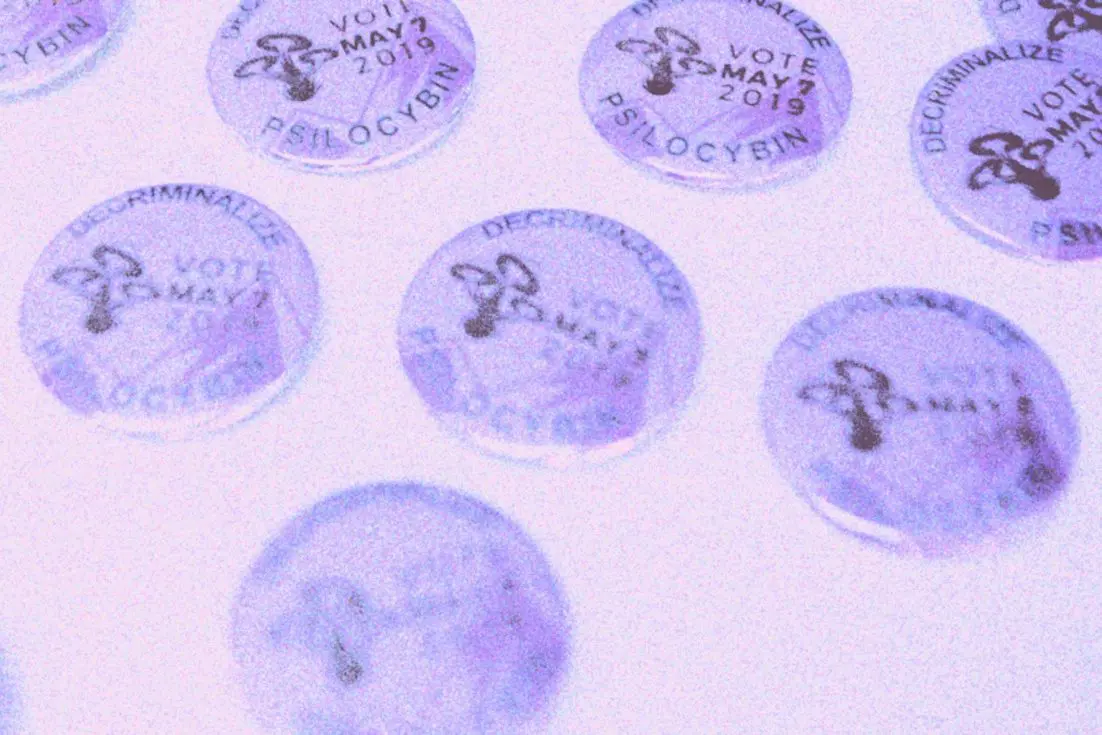Kevin Matthews let out a laugh when asked if shrooms had ever helped him. “They saved my life,” he says. The former cadet had high hopes for his time at West Point, one of the world’s finest military academies, but service-related depression forced him to be honorably discharged. It wasn’t until he discovered psilocybin that he found relief—and was catapulted back into public service, but, this time, of a very different nature.
In May, Matthews led the nation’s first successful effort to decriminalize psilocybin in the county of Denver. Initiative 301, which made the use and possession of psilocybin the lowest priority for law enforcement, passed by a nail-biting margin of 50.6 percent to 49.4 percent. Now more than 90,000 Denver residents are counting on Matthews to make sure that their hard-won victory doesn’t end at the ballot box.
Always projecting one step ahead, Matthews had registered a nonprofit in Colorado a full year before the vote: the Society for Psychedelic Outreach, Reform, and Education. Otherwise known as SPORE, the group is considered to be the new psychedelic lobby—joining the ranks of other suits on Washington DC’s K Street who push for influence among the powerful.
“We’re not going to be lobbying, but we’re definitely going to be supporting groups and organizations that are doing that,” Matthews says. SPORE’s main focus is education, he adds, as well as filling in the gaps between what the voters want the law to look like and what policy is realistic in a world with competing interests. At the moment, SPORE is focused on ensuring that decriminalization works as it was intended to in Denver.

To many of us, drug legalization or decriminalization seems as if it should be rather straightforward. Voters cast their ballots, and the very next day they can no longer be arrested for possessing that substance. But while we’d all like to believe democracy is as simple as voting for or against something (or someone), each election day is often followed by a mad scramble of public officials, law enforcement, bureaucrats and business interests working behind the scenes to define the new normal.
When a previously illegal substance is added to that mix, a county like Denver becomes saddled with awestruck community leaders who now must grapple with something they’ve spent most of their lives avoiding. The best example we have of these behind-the-scenes negotiations has been the legalization of cannabis, forcing state officials all over the country to consider possession limits, retail licensing, zoning provisions, and other unprecedented questions around possession, sale, and production of the substance.
How to Grow Shrooms Bundle
Take Both of Our Courses and Save $90!
SPORE hopes to accelerate this process by coordinating with legal experts, medical professionals, and lawmakers in order to put these changes into practice in a way that’s faithful to what voters envisioned when they cast their ballots.
In Denver, the decriminalization process begins with a Psilocybin Policy Review Panel, which was written into Initiative 301 and includes members of city council, medical experts, law enforcement, and a representative of the team who wrote the initiative. The panel, which is expected to be formed by the end of October, is meant to ensure that the measure is implemented without restrictive roadblocks. (See Massachusetts which took more than two years to open a dispensary after voters legalized recreational cannabis.)
Having met with officials in the mayor’s office and twice with the District Attorney since election day, Matthews is now thinking about everything from roadside ads for responsible use to training first responders in harm reduction tactics. And that’s not to mention possession limits, which he hopes to eliminate entirely when it comes to personal use.
In essence, SPORE is Matthews’ attempt to give the people of his community exactly what they voted for—but it also offers assistance and expertise to anyone who’s looking to replicate Denver’s success across the country. The idea is to bring together proponents of decriminalization into one cohesive political force.
With the exception of cannabis, which has found unifying political voices in national organizations like NORML (the National Organization for the Reform of Marijuana Laws), DPA (the Drug Policy Alliance), and the Marijuana Policy Project, efforts to decriminalize other psychoactive substances have largely been organized on a local level. These grassroots activists have had to build their organizations from the ground up and rely on research-based evidence coming out of organizations like MAPS (the Multidisciplinary Association for Psychedelic Studies).
Among these individuals is Ryan Munevar, campaign director of Decriminalize California, who now faces the colossal task of convincing nearly 20 million registered voters throughout the state to turn out in support of psilocybin decriminalization. While the city of Oakland already passed an all-plant decriminalization measure, and while Denver has shown that an election can be won with a paper-thin margin, California is often feared as the most expensive state in which to run a political campaign. (Moreover, a 2018 attempt at a similar initiative failed to gather enough signatures.)
Matthews learned the same hard lessons when his first two petitions to put a decriminalization question on the ballot in November of 2018 were denied by elections officials in Denver before they even reached voters. But Munevar is still optimistic, having consulted with Matthews and drawn inspiration from his success.
“Honestly we might even be able to swing a lot of Republicans to our side,” Munever says, pointing out that right-leaning voters were a base of support for the Denver initiative. In fact, garnering support from more conservative voters could be another important part of SPORE’s mission. Where evidence from FDA-approved psilocybin research from institutions like Johns Hopkins provides the data to support decriminalization, SPORE could mobilize the electorate to vote for it.

By the end of the year, SPORE aims to conduct statewide polling in Colorado to determine how residents feel about psilocybin decriminalization on a larger scale. But for now, Matthews has focused his efforts on finishing what he started in Denver with an eye toward taking SPORE to Washington DC and creating a nationwide movement.
Just like any other successful lobby, from the NRA to the AARP, identifying voters who will show up for the cause is a crucial part of convincing Congress to act.
“It’s unlikely that Denver city councilors were going to wake up one morning and say ‘I think we really need to look at the therapeutic benefits of psilocybin’ without the voters telling them to do so,” says attorney Noah Potter, a legal advisor to the Decriminalize Denver campaign and founder of the New Amsterdam Psychedelic Law blog.
Potter calls this group of voters the “psychedelic constituency,” and the advantage is that they play on both sides of the political spectrum. That’s good news for SPORE because it means that voters who otherwise favor one party all the way down the ballot might stop to consider a decrim question.
“I’ll say it this way, we got endorsements from the Green Party and the Libertarian Party,” says Matthews, suggesting that folks with various political beliefs support decriminalization—at least in Colorado. “From our experience we’ve seen that people from all walks of life are interested in this.”
It also means that SPORE could have a wide base of donors to back their efforts. With an eye toward a national decriminalization campaign, they are currently applying for 501(c)(3) status with the IRS, which would allow them to collect donations as a charitable organization with the potential to one day become a 501(c)(4), or an organization that can take direct political action and receive unlimited anonymous donations.
Matthews wouldn’t be the first to take this route of activism—in fact, the Oregon Psilocybin Society has already been approved by the IRS under the 501(c)(3) category—but his national aspirations make SPORE unique.
“We intend to get in contact with federal policymakers and learn more about what each party is focused on in terms of psychedelics, whether it be economics or social justice,” Matthews tells DoubleBlind, expressing a bit of frustration with the current field of presidential candidates. “I want to see a drug policy debate during this election cycle.”
How to Grow Shrooms Bundle
Take Both of Our Courses and Save $90!
Still, while presidential hopefuls have so far kept their distance from the issue, New York Rep. Alexandria Ocasio-Cortez has not shied away and even tried to add an amendment to a broader government spending bill which would have made it easier to study psychedelics. “From the opioid crisis to psilocybin’s potential w/ PTSD, it’s well past time we take drug use out of criminal consideration + into medical consideration,” the freshman Congresswoman tweeted after introducing her amendment in June.
Her efforts were blocked by members of Congress, but the attempt showed that there is an appetite for reform among what Matthews calls the Psychedelic Caucus—a group of potential allies on Capitol Hill composed of AOC, as well as Democrat Reps. Rho Khanna and Lou Correa of California, and even Republican Rep. Matt Gaetz of Florida.
“Our victory in Denver was a clear indication that there is now a political foundation for the psychedelic renaissance,” Matthews says. And in the coming months, if SPORE is able to demonstrate that enough voters care about decriminalization, Denver could be just the beginning.

DoubleBlind is a trusted resource for news, evidence-based education, and reporting on psychedelics. We work with leading medical professionals, scientific researchers, journalists, mycologists, indigenous stewards, and cultural pioneers. Read about our editorial policy and fact-checking process here.

DoubleBlind Magazine does not encourage or condone any illegal activities, including but not limited to the use of illegal substances. We do not provide mental health, clinical, or medical services. We are not a substitute for medical, psychological, or psychiatric diagnosis, treatment, or advice. If you are in a crisis or if you or any other person may be in danger or experiencing a mental health emergency, immediately call 911 or your local emergency resources. If you are considering suicide, please call 988 to connect with the National Suicide Prevention Lifeline.



